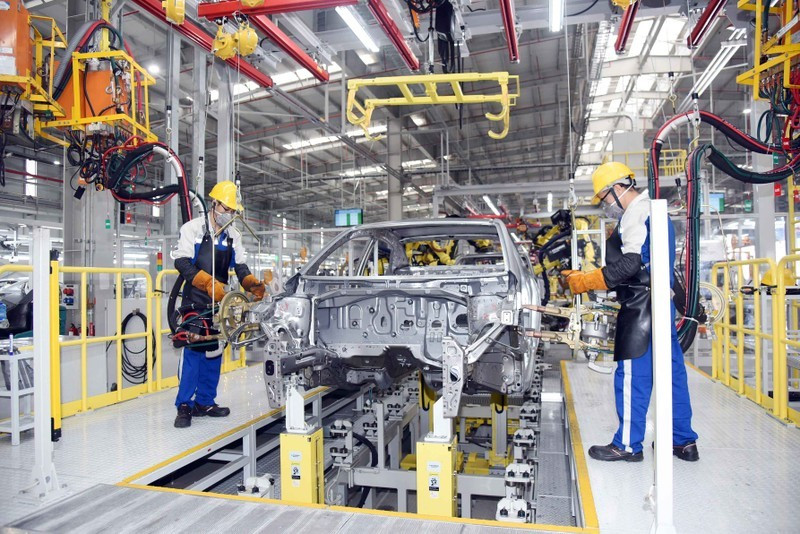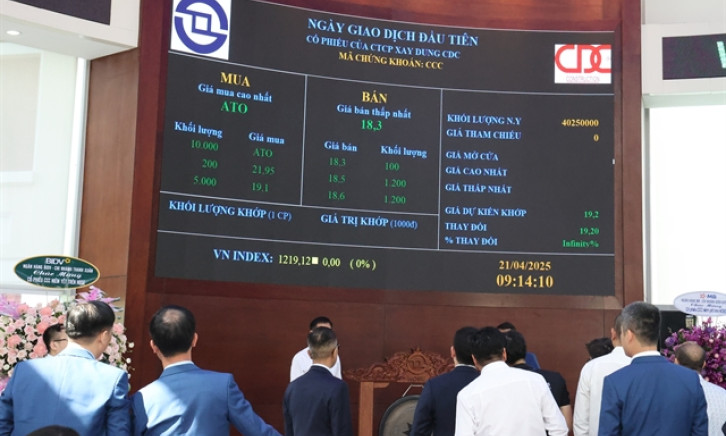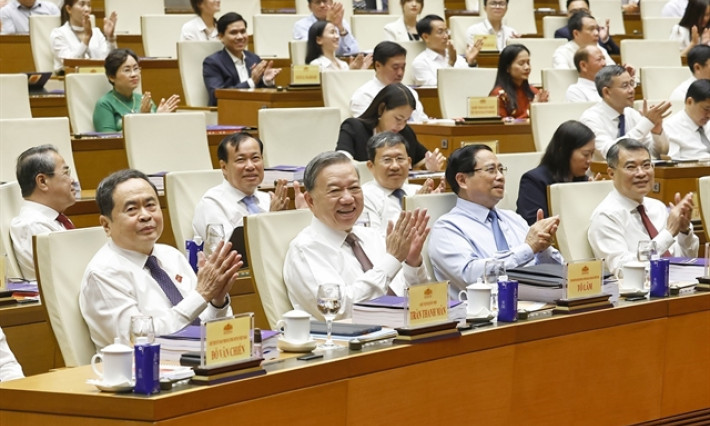Prioritising resources to support enterprise
Rapid and sustainable development is considered an inevitable trend in the operation and business practices of each enterprise. This not only brings benefits to the economy but also to the businesses themselves, such that they can win customers’ trust, gain competitive advantages over competitors, and create growth momentum in the long term.
However, it requires appropriate policies and determination of business leaders so that Vietnamese enterprises can grow rapidly in both quantity and quality and play a pivotal role in the economy.
Improving weaknesses
According to data from the National Business Registration Portal, Vietnam recorded about 136,000 newly established enterprises each year in the 2019-2022 period, a 20% increase over the 2015-2018 period (115,000 enterprises each year) and 2.5 times higher than the 2010-2014 period.
Despite rapid growth in numbers, businesses’ development is not very sustainable and businesses lack the ability to cope with unpredictable fluctuations from the market.
The number of enterprises leaving the market every year only accounts for about 35%-48% of newly registered enterprises in the 2016-2019 period, but the number increased to 55%-65% in the 2020-2022 period.
By the end of 2022, Vietnam had about 850,000 active businesses, about 15,300 non-agricultural cooperatives and about 5.2 million business households. There are only eight businesses operating for every 1,000 people, while the ratio is 11 businesses per 1,000 people in ASEAN countries, and 100 businesses per 1,000 people in the US.
According to economic expert, Dr. Le Duy Binh, the development in the quantity and quality of Vietnamese enterprises is making a decisive contribution to the realisation of the goal of turning Vietnam into a developing country by 2025, surpassing the lower-middle-income level, and realising the next goals set for 2030 to 2045.
The number of newly registered enterprises has increased every year in the past five years, but the number of enterprises leaving the market is also very large, showing that the growth momentum has slowed down.
Many enterprises have low production and business efficiency, outdated management mechanism, small scale, low technology level, and weak financial and governance capacity. Most enterprises still conduct processing and assembling with low added value and low efficiency in participating in the global value chain.
Therefore, it is not necessary to develop too many businesses without real value and sustainable operation. Instead, business leaders need to have suitable awareness to overcome weaknesses and further improve their competitiveness, management system and financial capacity.
Vietnamese enterprises today are mostly small and medium sized, with outdated technology, lack of investment in research and innovation, low productivity, low product quality, and low competitiveness.
In addition, enterprises lack linkages with each other and with other economic sectors and have low access to capital, while a few enterprises have high competitiveness at home and abroad.
According to Dr. Le Duy Binh, the Government needs to spend more resources on supporting businesses and avoid scattered, fragmented and discrete investment, thereby, creating a synergistic effect for the business community to develop sustainably on the basis of increasing competitiveness.
Specifically, supporting the sustainable development of businesses must be considered a key task in the coming time, in addition to creating an increasingly improved business investment environment. At the same time, it is necessary to focus on improving the growth rate of efficient businesses instead of chasing the number of newly established businesses.
Creating favourable environment
In recent years, the Government has accelerated the implementation of three strategic breakthroughs, including: the completion of development institutions, the development of human resources, and the building of a synchronous and modern infrastructure system in both economic and social terms.
However, according to Chairman of the Vietnam Private Hospital Association Nguyen Van De, our country’s legal system still has many shortcomings while the business investment environment is not truly open, so there is still large room for reform.
Enterprises are reporting overlap and conflict between many legal regulations while they are still required to carry out many duplicate administrative procedures and submit many similar documents to State agencies, leading to costly transactions.
The survey results of the Provincial Competitiveness Index (PCI) 2021 announced by the Vietnam Confederation of Commerce and Industry (VCCI) in 2022 also showed that informal costs are still quite common in conducting some essential procedures such as market entry or access to production and business premises.
In addition, the proportion of enterprises paying informal fees remains high in some activities, such as construction inspection (67% of surveyed enterprises) and the issuance of conditional business certificates (61% of surveyed enterprises). Enterprises must also pay unofficial costs in procedures or activities such as market management, environmental inspection, tax, fire prevention and land inspection.
The report on business performance of VCCI also points out the top five difficulties that businesses are facing, including: finding customers (69% of surveyed businesses), accessing capital (47%), market volatility (33%), searching for suitable personnel (28%) and searching for business partners (24%).
Deputy General Secretary of VCCI Dau Anh Tuan said that many businesses feel insecure about the stability of the policy, so it is important to resolutely protect businesses. Some policies need to be redesigned and implemented consistently in the direction of creating favourable conditions for enterprises to conduct business.
Experts recommend that the Government consider removing barriers and difficulties for businesses as an important political task, helping businesses to have proactive adaptation, quick recovery, and sustainable development. Along with the support from the State, businesses need to actively seize and take advantage of opportunities and have a plan to adapt to future changes.
Accordingly, it is necessary to seize new business trends, promote digital transformation, and apply science and technology to improving productivity, quality, efficiency, and competitiveness, thereby creating development momentum and affirming the position of Vietnam’s economy in the international arena.






